未來進行式 (Future Continuous Tense)完整指南:掌握表達未來進行動作的關鍵時態
當你想精確描述「明天這個時候我會正在做什麼」,或委婉詢問「你明天會使用那台電腦嗎」時,你需要的正是未來進行式。這一時態讓英語表達如同雕刻般精準,能描繪出未來時間點上正在發生的動作,為你的英語溝通增添專業感和時間層次感。而掌握它的關鍵,就在於理解其獨特的時間概念和語法結構。
未來進行式(Future Continuous Tense)是英語十二種時態之一,專門用於表達在未來某個時間點正在進行或持續發生的動作。它由「will + be + 動詞ing形式」組成,強調的是動作在特定未來時刻的「進行狀態」,而非動作的開始或結束。
這一時態在英語表達中具有多層次的語義和功能。首先,它能清晰標記時間線上的位置——從現在延伸到未來的某個時刻,讓聽者準確掌握事件發生的時間框架。其次,相較於一般將來時(will do)強調動作發生這一事實,未來進行式更強調動作進行的狀態和過程,增添了時間的立體感。此外,它還承載著特殊的交際功能——當表達「This time next week, I will be sitting on a beach」時,不僅是時間信息的傳達,更包含說話者對未來的期待和規劃。
未來進行式還與近未來時(be going to)形成微妙對比:後者強調的是計劃或有跡象的預測,而未來進行式則側重描述在特定時間點的進行狀態。掌握這些細微差別,能讓你的英語表達更加精準、自然,符合母語者的使用習慣。
本文將系統介紹未來進行式的概念、用法、構成方式及常見錯誤。您將學習如何正確構建未來進行式句型,分辨它與其他未來時態的區別,以及避免常見的用法誤區。透過豐富的例句和實用練習,PREP將帶您全面掌握這一關鍵時態。
現在,讓我們一起深入探索未來進行式的奧秘,提升您的英語時態應用能力,讓您的表達更加精準流暢!

I. 未來進行式是什麼?
1. 概念
未來進行式(Future Continuous Tense)是用來表示在未來某個特定時間點正在進行或發生的動作。這個時態能夠讓我們描述未來某個時刻正在進行的事情,或在未來某段時間內持續發生的動作。
未來進行式強調的是動作在特定未來時間的「進行狀態」,而非動作的開始或結束。例如:"Tomorrow at 8 p.m., I will be studying for my exam."(明天晚上8點,我將正在準備考試。)另一個例子:"While you clean the house, I will be cooking dinner."(當你打掃房子時,我將正在煮晚餐。)這表示兩個動作將在未來同時進行,其中一個作為另一個的背景動作。

2. 未來進行式的時間軸
未來進行式在時間軸上有其特定的位置和表達方式:
-
未來進行式描述的是未來某個時間點(時間點A)正在進行的動作
-
說話的時間點在現在(時間點0)
-
動作發生在未來時間點A,並且在那個時間點上呈現「正在進行」的狀態
時間軸示意:
現在(0)------------> 未來時間點A(正在進行的動作)------------> 未來
未來進行式特別適合表達在未來某個特定時刻(如:明天下午三點)或特定時間段(如:下週)內正在進行的動作。
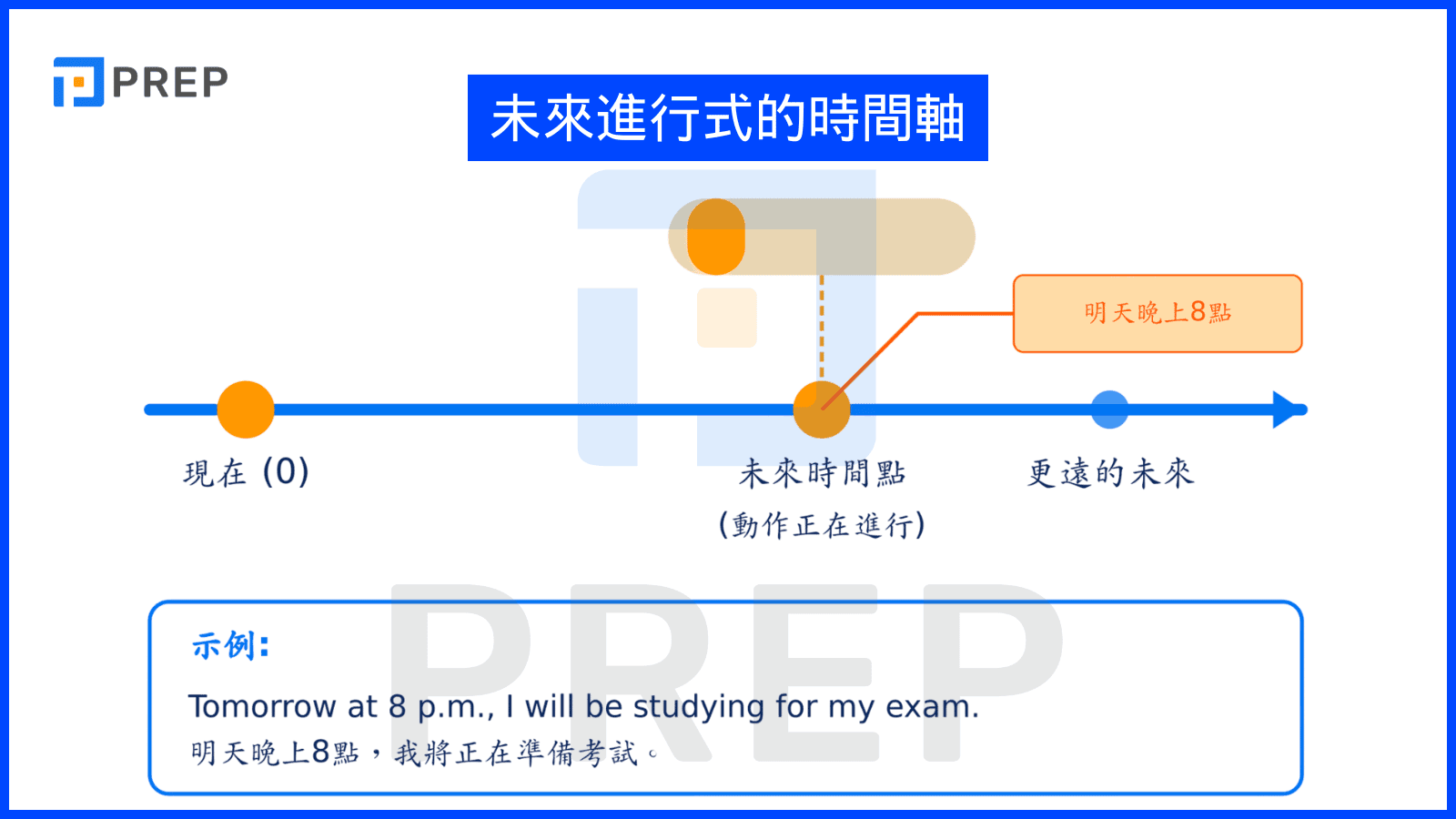
II. 未來進行式公式
未來進行式的基本結構相對簡單,但使用時需注意各個元素的正確形式。以下是未來進行式的基本公式:
1. 肯定句公式
Subject + will + be + verb-ing (動詞ing形式)
例句:
-
I will be studying English in my room tomorrow morning.(明天早上我將在我的房間學習英文。)
-
She will be working on her homework during the weekend.(週末期間她將正在做她的家庭作業。)
2. 否定句公式
Subject + will + not + be + verb-ing (動詞ing形式)
例句:
-
I will not be watching TV when you call tonight.(今晚你打電話時,我將不會正在看電視。)
-
They will not be traveling to Taipei next month.(下個月他們將不會去台北旅行。)
3. 疑問句公式
Will + subject + be + verb-ing (動詞ing形式)?
例句:
-
Will you be attending the class with me tomorrow morning?(明天早上你會和我一起上課嗎?)
-
Will she be working in the library this afternoon?(今天下午她會在圖書館工作嗎?)
4. 特殊疑問句公式
Question word + will + subject + be + verb-ing (動詞ing形式)?
例句:
-
What will you be doing when I arrive at your house?(當我到你家時,你會正在做什麼?)
-
Where will they be staying when they visit Taipei?(他們訪問台北時會住在哪裡?)
-
How long will they be staying at your home?(他們會在你家待多久?)
在形成未來進行式時,需特別注意以下幾點:
-
主詞(Subject)可以是任何人稱(I, you, he, she, it, we, they)
-
助動詞will不會因人稱變化而改變形式
-
be始終保持原形
-
主要動詞必須轉換為現在分詞(ing形式)
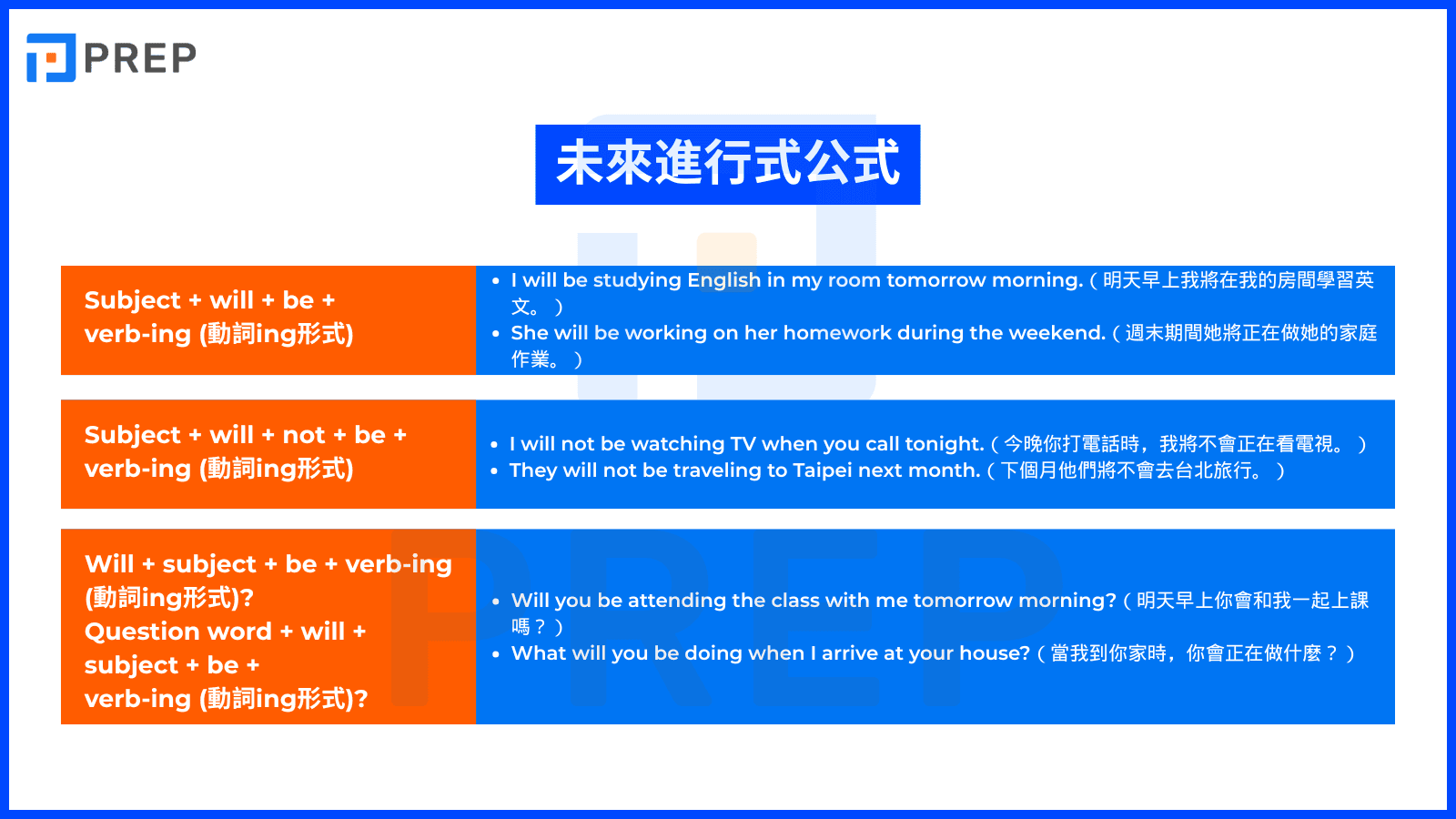
III. 未來進行式 Future Continuous Tense 用法
未來進行式有多種用法,了解這些用法將幫助我們在適當的語境中正確使用這一時態。以下是未來進行式的主要用法:
1. 表示在未來某個時間點正在進行的動作:這是未來進行式最基本、最常見的用法,用來描述在未來某個特定時刻正在發生的事情。例句:
-
This time next week, I will be swimming in the ocean.(下週的這個時候,我將正在海裡游泳。)
-
At eight tomorrow morning, my sister will be cooking breakfast.(明天早上八點,我姐姐將正在做早餐。)
2. 表示在未來某段時間內持續進行的動作:用來描述在未來一段時間內會持續進行的動作。例句:
-
I will be working on this painting for two more days.(接下來的兩天,我將繼續畫這幅畫。)
-
She will be studying English in Taipei for six months.(她將在台北學習英語六個月。)
3. 表示按計劃或安排即將發生的動作:未來進行式常用於表示已經計劃好的、按照預定會發生的動作,特別是強調這些動作是自然而然會發生的,不帶有特別的意圖或目的。例句:
-
We will be leaving for school at seven tomorrow morning.(明天早上七點我們將出發去學校。)
-
The bus will be arriving at the station soon.(公車很快將到達車站。)
4. 委婉表達請求或詢問計劃:未來進行式可用於禮貌地詢問他人的計劃或安排,這種用法比直接使用一般疑問句更顯得委婉有禮。例句:
-
Will you be using the computer in the next hour?(接下來的一小時你會使用電腦嗎?)
-
Will you be staying at home this Saturday night?(這週六晚上你會待在家嗎?)
5. 表示在未來某一時間段的背景動作:用來描述在未來某個時間段內會發生的背景動作,這些動作常作為其他將要發生事件的背景。例句:
-
When you arrive, I will be washing my dirty clothes.(當你到達時,我將正在洗我的髒衣服。)
-
While I cook dinner, my brother will be doing homework.(當我做晚餐時,我弟弟將正在做功課。)
6. 表達禮貌的詢問:未來進行式可用於非常禮貌地詢問某人的計劃,特別是當可能會打擾對方時。例句:
-
Will you be going to the store later today?(今天晚些時候你會去商店嗎?)
-
Will you be seeing your teacher at school tomorrow?(明天你會在學校見到你的老師嗎?)
7. 表示必然會發生的事情:有時未來進行式用於表示按照自然規律或必然趨勢一定會發生的事情。例句:
-
The sun will be rising at five o'clock tomorrow morning.(明天早上五點太陽將升起。)
-
More people will be using bikes in our city soon.(很快我們城市將有更多人使用自行車。)
8. 避免對未來的直接預測: 使用未來進行式有時可以避免對未來做出直接的預測或承諾,使表達更加中性。例句:
-
I will be thinking about your idea during my walk.(散步時我會考慮你的想法。)
-
We will be reading your story in class next week.(下週我們將在課堂上閱讀你的故事。)
9. 表示可能會持續發生的動作:未來進行式可以用來表示在未來可能會持續發生的動作,特別是那些有重複性質的動作。例句:
-
For the next week, I will be waking up early.(接下來的一週,我將每天早起。)
-
She will be riding her bike to school every day.(她將每天騎自行車去學校。)
10. 表達對未來情況的假設:有時候未來進行式可以用來表達對未來情況的假設或推測。例句:
-
By next summer, I will be living in a new house.(到明年夏天,我將住在一個新房子。)
-
At school tomorrow, everyone will be wearing a blue shirt.(明天在學校,每個人都將穿藍色襯衫。)
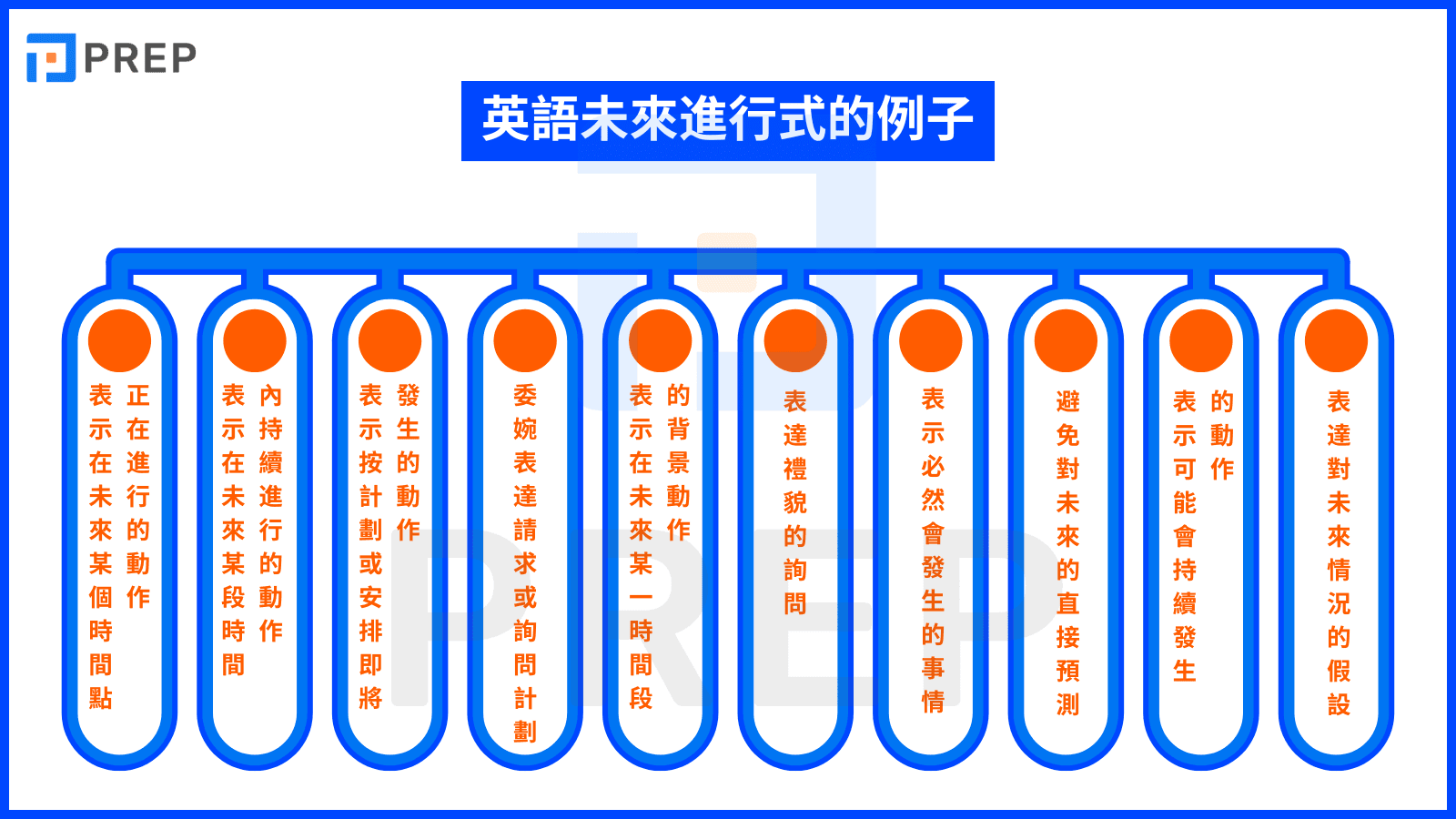
IV. 使用未來進行式的注意事項
在使用未來進行式時,有一些需要特別注意的事項,以避免常見的錯誤:
1. 狀態動詞通常不使用進行式
狀態動詞(State Verbs)表示的是狀態而非動作,因此通常不使用進行式形式,包括未來進行式。常見的狀態動詞包括:
-
感知動詞:see, hear, smell, taste, feel
-
情感動詞:like, love, hate, prefer, want, wish
-
思考動詞:know, understand, believe, remember, forget, think (指認為)
-
擁有動詞:have (指擁有), own, possess, belong
-
其他:be, exist, cost, seem, appear, consist
錯誤例句:
-
❌ I will be knowing the test results next Monday.
-
✓ I will know the test results next Monday.(下週一我會知道考試結果。)
-
❌ She will be loving her new school very much.
-
✓ She will love her new school very much.(她會非常喜歡她的新學校。)
2. 有些動詞在特定意義下可用於進行式
某些動詞可能具有多種含義,當表示「動作」而非「狀態」時,可以使用進行式。例如:
-
have: 當表示「擁有」時是狀態動詞,但表示「進行、參與」等意義時可用進行式
-
❌ I will be having two cats in my home soon.(表示擁有)
-
✓ I will be having dinner with my friends tonight.(表示進餐)
-
-
think: 當表示「認為、相信」時是狀態動詞,但表示「思考、考慮」時可用進行式
-
❌ I will be thinking that your idea is good.(表示認為)
-
✓ I will be thinking about your idea all day.(表示考慮)
-
3. 時間狀語的選用
使用未來進行式時,常與特定的時間狀語搭配,這些時間狀語幫助明確動作發生的時間點或時間段。常見的時間狀語包括:
-
特定未來時間點:tomorrow at 8 p.m., this time next week, at 3 p.m. tomorrow。例句:This time tomorrow, I will be sleeping in my bed.(明天這個時候,我將正在床上睡覺。)
-
未來時間段:all day tomorrow, during the summer, for the next two hours, next week。例句:I will be cleaning my room all morning tomorrow.(明天整個早上我都將在打掃我的房間。)
4. will be going to 與 will be doing 的區別
"will be going to do" 和 "will be doing" 有時容易混淆:
-
"will be going to do" 表示「將要去做某事」,強調的是即將前往某處做某事。例句:I will be going to play soccer in the park.(我將去公園踢足球。)
-
"will be doing" 是未來進行式,強調在未來某時刻正在進行的動作。例句:I will be playing soccer in the park.(我將正在公園踢足球。)
兩句意思相近,但前者更強調「去」的動作,後者更強調「拜訪」這個動作在未來的進行狀態。
5. 避免與表示確切時間點的狀語一起使用
未來進行式通常與表示一段時間的狀語一起使用,而不是與表示確切時間點的狀語一起使用。
不自然的例句:
-
❌ I will be finishing my homework at six o'clock exactly.
更自然的表達:
-
✓ I will finish my homework at six o'clock exactly.(我將在六點整完成我的家庭作業。)
-
✓ I will be doing my homework around six o'clock.(六點左右我將正在做家庭作業。)
V. 辨識英語未來進行式的標誌
在閱讀和聽力練習中,識別未來進行式的關鍵標誌可以幫助我們更好地理解句子的含義和時間概念。以下是一些辨識未來進行式的重要標誌:
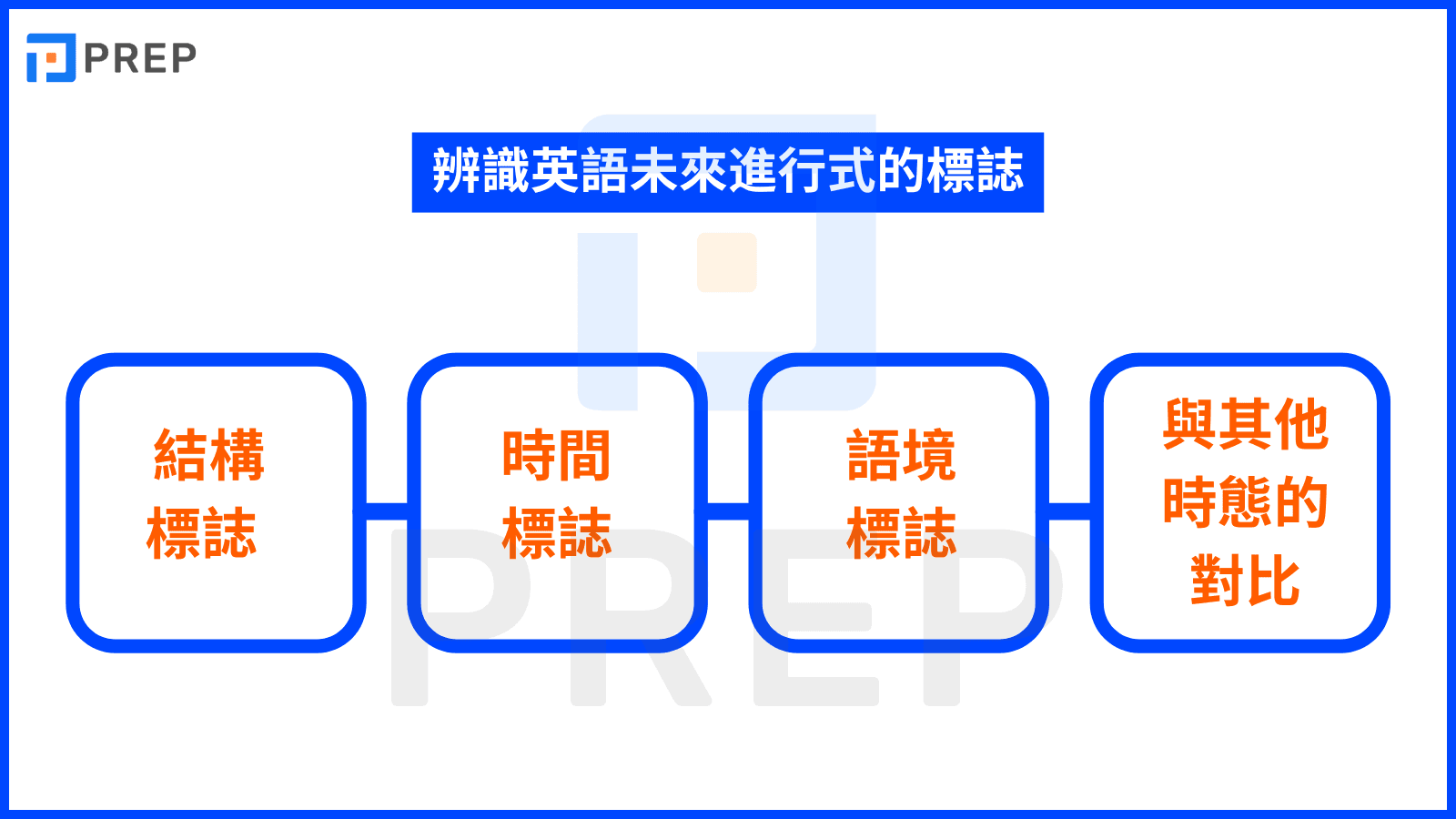
1. 結構標誌
未來進行式的最明顯標誌是其特定結構:will + be + verb-ing。當看到這個結構時,我們可以立即識別出這是未來進行式。例句:
-
She will be wearing a blue dress at my party.(在我的派對上她將穿藍色連衣裙。)
-
They will be planting trees in the garden tomorrow.(明天他們將在花園裡種樹。)
2. 時間標誌
與未來進行式一起使用的時間狀語通常暗示未來時間點或時間段,這些也是識別未來進行式的重要線索。常見的未來時間標誌包括:
-
tomorrow(明天)
-
next week/month/year(下週/下個月/明年)
-
this time tomorrow/next week(明天/下週的這個時候)
-
in the future(在未來)
-
by this time next year(到明年的這個時候)
-
during the next few days/weeks(在接下來的幾天/幾週內)
例句:
-
This time next month, we will be swimming in the pool.(下個月的這個時候,我們將在泳池游泳。)
-
Next year, more students will be learning English online.(明年,更多學生將在線學習英語。)
3. 語境標誌
有時候,語境也能幫助我們識別未來進行式。特別是當談論未來計劃、安排或預測時,未來進行式經常出現。例句:
-
When you call tonight, I will be watching my favorite show.(今晚當你打電話時,我將正在看我最喜歡的節目。)
-
Don't visit at noon because we will be eating lunch.(不要在中午來,因為那時我們將正在吃午餐。)
4. 與其他時態的對比
未來進行式經常與其他未來時態一起使用,通過對比可以更清楚地識別不同時態的用法。例句:
-
I will call you when I arrive, but if you call me at 9 p.m., I will be having dinner.(我到達時會給你打電話,但如果你晚上9點打給我,我將正在吃晚餐。)。在這個例句中:
-
"I will call you" 使用的是一般將來時,表示未來的單一動作
-
"when I arrive" 使用的是一般現在時,表示時間狀語從句中的未來動作
-
"I will be eating dinner" 使用的是未來進行式,表示在未來特定時間正在進行的動作
-
By the time you finish school, I will have completed my work, and I will be waiting for you at the bus stop.(等你放學時,我將已經完成我的工作,並且我將正在公車站等你。)。在這個例句中我們可以看到三種不同的時態搭配使用:
-
"By the time you finish school" 使用的是一般現在時,在時間狀語從句中表示未來動作
-
"I will have completed my work" 使用的是未來完成時,表示在未來某時間點之前已經完成的動作
-
"I will be waiting for you" 使用的是未來進行式,表示在未來某時間點正在進行的動作
-
VI. 英語未來進行式中動詞加ing的規則
在未來進行式中,主要動詞需要轉換成現在分詞(-ing形式)。這一轉換遵循一定的規則,掌握這些規則能幫助正確形成未來進行式。
1. 一般規則:直接加-ing
大多數動詞只需要直接在詞尾加上-ing。例如:
-
work → working: I will be working in the garden tomorrow morning.(明天早上我將在花園裡工作。)
-
play → playing: The children will be playing games after school.(孩子們放學後將玩遊戲。)
-
read → reading: She will be reading a book in the library.(她將在圖書館看書。)
2. 以不發音的-e結尾的動詞:去e加-ing
如果動詞以不發音的-e結尾,需要去掉e再加-ing。例如:
-
write → writing: I will be writing letters to my friends tomorrow.(明天我將給我的朋友們寫信。)
-
make → making: They will be making cookies when we visit them.(當我們拜訪他們時,他們將正在做餅乾。)
-
take → taking: She will be taking photos in the park.(她將在公園拍照。)
3. 以單個元音字母加單個輔音字母結尾,且重音落在最後一個音節的動詞:雙寫最後一個字母再加-ing
這類動詞在加-ing時需要雙寫最後一個輔音字母。例如:
-
run → running: I will be running in the park every morning.(我每天早上都將在公園跑步。)
-
swim → swimming: They will be swimming in the river this weekend.(這個週末他們將在河裡游泳。)
-
plan → planning: We will be planning our trip to Taipei soon.(我們很快將計劃去台北的旅行。)
4. 以-ie結尾的動詞:ie變y加-ing
如果動詞以-ie結尾,需要將ie變成y,再加-ing。例如:
-
lie → lying: She will be lying on the grass in the park.(她將躺在公園的草地上。)
-
die → dying: These old trees will not be dying soon.(這些老樹短期內不會死亡。)
-
tie → tying: I will be tying my shoes before the race.(比賽前我將繫好我的鞋帶。)
5. 以-l結尾的動詞(在英式英語中):有時需要雙寫l加-ing
在英式英語中,有些以-l結尾的動詞在加-ing時需要雙寫l,但在美式英語中通常不這樣做。例如:
-
travel → travelling (英式)/ traveling (美式): They will be travelling to Japan for ten days.(他們將去日本旅行十天。)
-
cancel → cancelling (英式)/ canceling (美式): We will be cancelling our trip due to rain.(因為下雨,我們將取消我們的旅行。)
6. 一些特殊動詞的-ing形式
某些動詞有特殊的-ing形式,需要特別記住。例如:
-
be → being: He will be being interviewed by his new boss.(他將正在接受新老闆的面試。)
-
see → seeing: I will be seeing my dentist on Monday morning.(週一早上我將去看牙醫。)
-
go → going: They will be going to the zoo next weekend.(下週末他們將去動物園。)
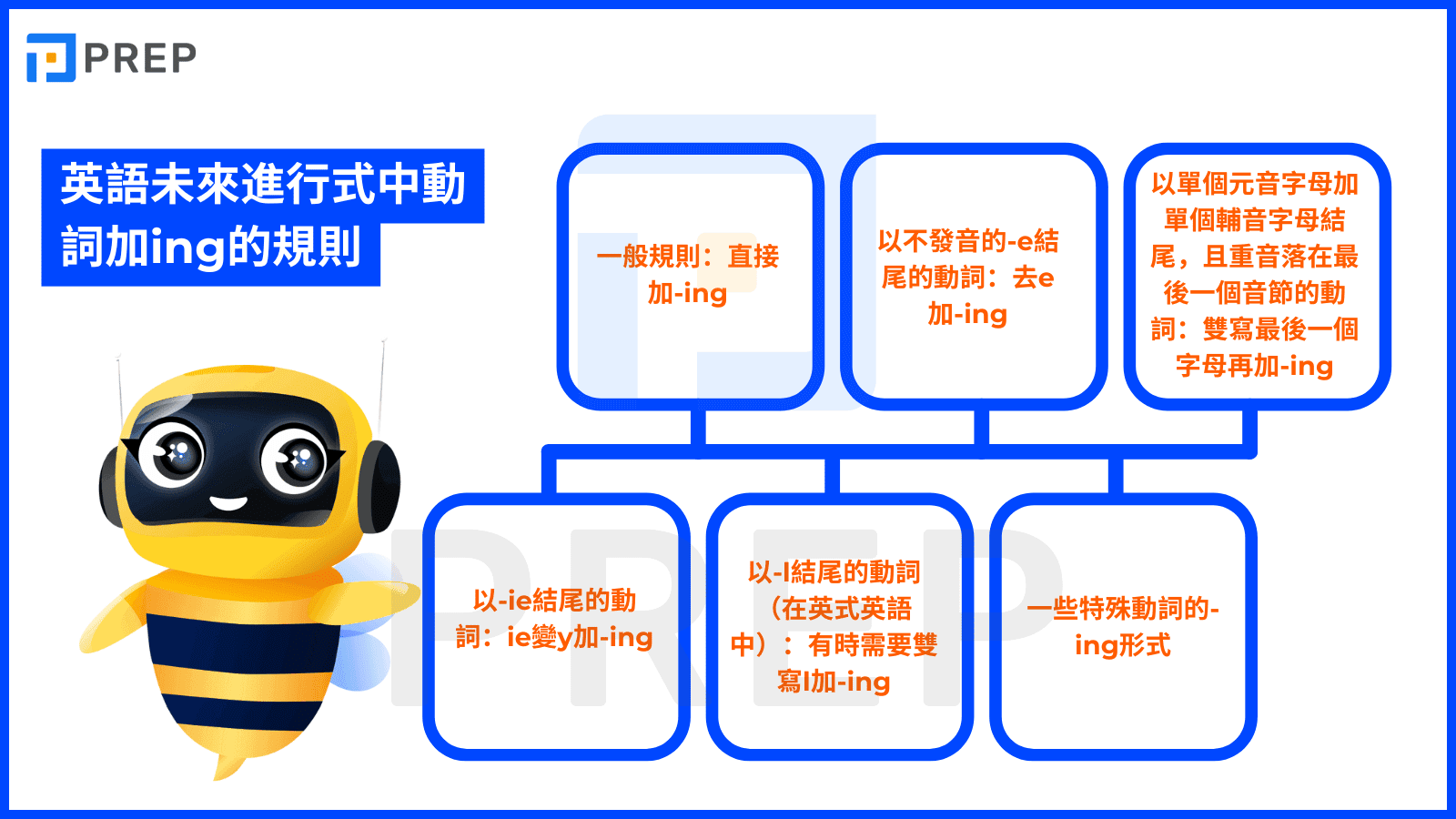
VII. 區分未來進行式、未來簡單式和近未來式
在英語中,表達未來的時態有多種,其中最常見的是未來進行式、一般將來時(未來簡單式)和近未來時(be going to)。了解這三種時態的區別和適用場景,有助於我們更準確地表達未來的事件和狀態。
|
特點 |
未來進行式 |
未來簡單式 |
近未來式 |
|
結構 |
will + be + verb-ing |
will + verb |
be + going to + verb |
|
強調重點 |
強調動作在特定時間的進行狀態 |
強調動作的發生,或表示意願/預測 |
強調計劃或有跡象的預測 |
|
決定時間 |
通常是事先安排或計劃的 |
可以是當下決定的 |
通常是事先計劃或基於現有跡象 |
|
確定性 |
中等 |
較低(尤其是預測時) |
較高(尤其是基於跡象時) |
|
常用時間狀語 |
this time tomorrow, all day, during next week |
soon, tomorrow, next year |
soon, in the near future |
|
例句 |
This time tomorrow, I will be flying to Tokyo. (明天這個時候,我將正在飛往東京。) |
The weather will be sunny tomorrow. (明天天氣將會晴朗。) [表示預測] |
She is going to have a baby next month. (她下個月要生孩子了。) [即將發生的事情] |
VIII. 未來進行式和近未來式練習題
透過實際練習來鞏固對未來進行式的理解和運用能力。以下提供一系列練習題,幫助您熟練掌握未來進行式及其與近未來式的區別。
1. 填空練習:選擇正確的時態
在下列句子的空格中,選擇未來進行式或近未來式填入,並說明為何選擇該時態。
-
This time next week, I _____________ (swim) in the ocean.
-
Look at those clouds! It _____________ (rain) soon.
-
_____________ you _____________ (use) your laptop this afternoon?
-
I _____________ (work) on this project all day tomorrow.
-
Be careful! The cup _____________ (fall) off the table.
-
When you arrive, we _____________ (have) dinner.
-
I have bought some paint. I _____________ (paint) my room.
-
The train _____________ (leave) at 3 p.m. tomorrow.
-
Don't call me between 8 and 9. I _____________ (study) for my exam.
-
I feel terrible. I think I _____________ (be) sick.
2. 改寫練習:將句子改寫為未來進行式
將以下句子改寫為未來進行式形式:
-
I will visit my parents this weekend.
-
She will teach English in Taiwan next year.
-
They will play basketball tomorrow afternoon.
-
We will celebrate his birthday next Saturday.
-
He will attend the conference in Taipei.
-
It will snow in the mountains next week.
-
The train will arrive at 9 p.m.
-
I will finish this report by tomorrow.
-
The president will give a speech tonight.
-
We will wait for you at the entrance.
3. 答案
|
1. 填空練習:選擇正確的時態 |
2. 改寫練習:將句子改寫為未來進行式 |
|
|
未來進行式是英語時態系統中一個重要且實用的組成部分,它讓我們能夠精確地描述未來某個時間點或時間段內正在進行的動作。通過本文的學習,我們對未來進行式的概念、用法、構成規則以及與其他未來時態的區別有了全面的了解。PREP希望本文能夠成為您學習未來進行式的有力工具,幫助您在英語學習之路上更進一步。
在家利用 Prep 的獨家 AI 進行雅思自學!現在報名線上雅思課程,立即獲得高效率學習規劃、詳細批改與智慧練習。特別是 Teacher Bee AI,將成為您學習過程中的智慧夥伴。
點擊此處把握機會,立即行動!
現在就下載 PREP App,在家自主學習雅思,體驗高品質的線上備考,迅速提升成績。

你好!我叫黃秋賢。現在在網站 prepedu.com 的部落格擔任產品內容經理。
我有超過5年的英語、韓語等外語自學經驗,並準備過 IELTS、TOEIC、TOPIK 等考試,累積了豐富的實戰知識,也曾協助數千位在語言學習上遇到困難的人。希望以上的分享能幫助大家在家中更有效率地自學!
評論











